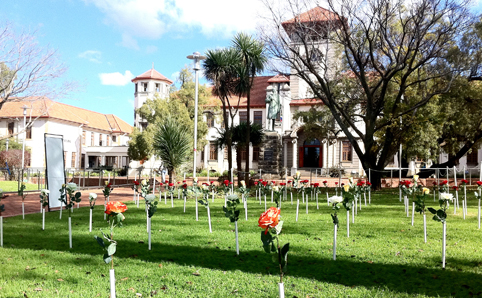Latest News Archive
Please select Category, Year, and then Month to display items
12 June 2024
|
Story Zinzi Zumana
|
Photo supplied
 UFS Lekgotla Men’s Well-being Programme: addiction dialogue encourages empowerment and exchange of ideas.
UFS Lekgotla Men’s Well-being Programme: addiction dialogue encourages empowerment and exchange of ideas.
The University of the Free State (UFS)
Division of Student Affairs hosted a ‘Dialogue on Addiction’ at the Equitas Senate Hall on 20 April 2024 as part of the UFS Lekgotla Men’s Well-being Programme. Led by the esteemed
Ace Moloi, male students’ well-being was addressed by focusing on topics relating to substance abuse, the ‘hookah pipe’, pornography, and digital addiction.
Ogaisitse Diseko, an expert on substance abuse, highlighted the misconceptions and societal impact of substances such as ‘bath salts’. Male students shared personal experiences, emphasising the need for early interventions and community backing to combat addiction.
Prof Noluxolo Gcaza, a Nelson Mandela University Professor specialising in digital wellness, presented on digital well-being, internet safety, and managing screen time. The dialogue concluded with Billy Mogadi sharing his journey from addiction to recovery, underscoring the human toll and the possibility of transformation.
Mogadi’s story resonated deeply, fostering hope and empowerment among attendees. The event highlighted the power of dialogue and support in addressing addiction issues. By promoting genuine interaction and providing the necessary tools, such initiatives contribute to community well-being and development. The UFS Lekgotla Men’s Well-being programme advances its goal of fostering healthier lives through open communication and mutual support.
“Month of Compassion”
2011-05-24
 |
|
Hundred roses were planted in front of our Main Building
Photo: Duard Grobbelaar
|
The Health and Wellness Centre at our university recently planted roses on the Main Campus in memory of people who passed away in the past year due to some illnesses and other personal issues.
Each rose represented 2 550 South Africans who have passed away and 100 roses were planted in front of the Main Building on our Main Campus. There were 51 red roses which represented deaths due to HIV, 14 yellow roses for those who passed away due to ischemic heart disease, 13 white roses for deaths caused by stroke, 11 orange roses for deaths caused by turbeculosis and 11 pink roses for deaths caused by interpersonal violence.
The rose garden managed to draw a lot of attention and people, many of which were members of our own staff and several students, actually took time from their busy schedules to have a look at its spectacular beauty.